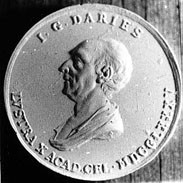| Profile | Major Works | Resources |
Joachim Georg Darjes, 1714-1791.

18th C. German Lutheran theologian and Cameralist economist.
Born in Gustrow (Duchy of Mecklenberg), Joachim Georg Darjes was trained in theology at the universities of Rostock and Jena, where he apparently came under the influence of Christian Wolff. After earning his master's degree in 1735, Darjes switched to law, receiving his doctorate in 1739. Darjes was appointed as professor of moral and political philosophy at the University of Jena in 1744, and served as a counselor to the dukes of Saxe-Weimar and Eisenach. Darjes remained at Jena until 1763, when he was invited by Frederick the Great of Prussia to take up a position at the University of Frankfurt-am-Oder.
J.G. Darjes was a German Neo-Cameralist with a strong practical bent. His major work, the Erste Gründe (1756), contained a clear distillation of Cameralist ideas. He is less concerned with outlining general principles and more in setting out specific practical guidelines for state economic administrators. Although much of it is unoriginal, it is notable for, among other things, Darjes's clarification and organization of Cameralist ideas and for the defense of Cameralism as an academic subject worthy of inquiry. It can be said that Darjes's book is responsible for bringing Cameralism into the classroom.
|
Major Works of Joachim Darjes
|
|
HET
|
|
Resources on J.G. Darjes
|
All rights reserved, Gonçalo L. Fonseca
